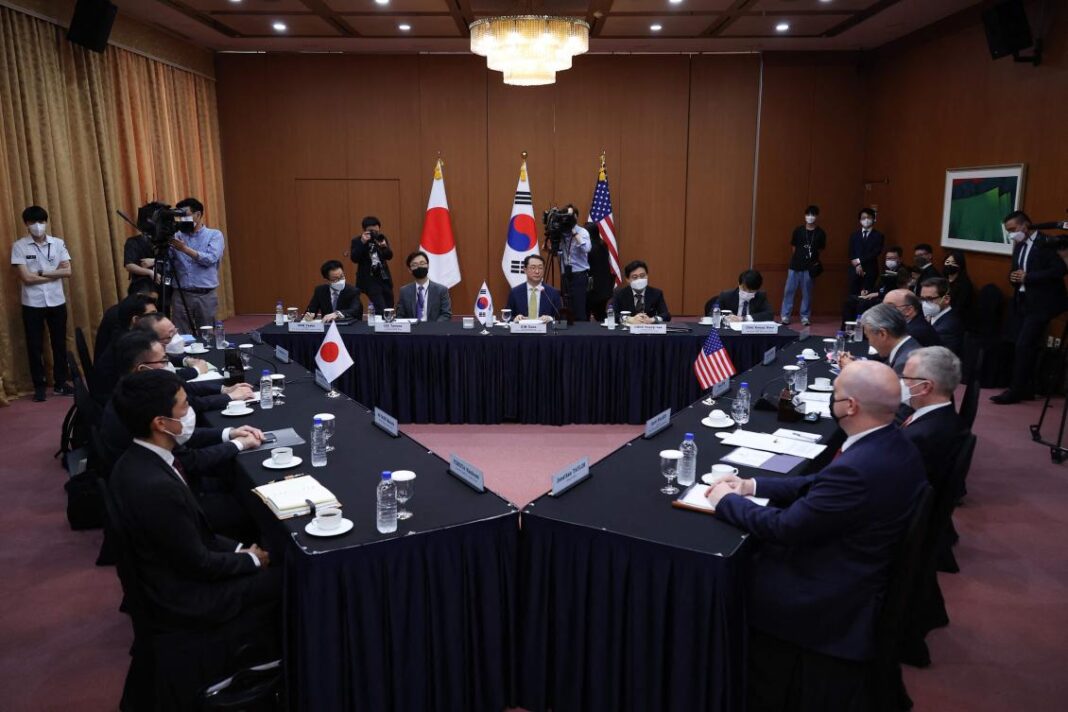SEOUL, South Korea: President Joe Biden’s special envoy for North Korea said Friday the United States is “preparing for all contingencies” in close coordination with its South Korean and Japanese allies as it monitors North Korean arrangements for a possible nuclear test explosion that outside officials say could be imminent.
South Korean and US intelligence officials have said they detected North Korean efforts to prepare its northeastern testing ground for another nuclear test, which would be its seventh since 2006 and the first since September 2017, when it claimed to have detonated a thermonuclear bomb to fit on its intercontinental ballistic missiles.
Sung Kim, the US special representative for North Korea, was in Seoul for a trilateral meeting with his South Korean and Japanese counterparts to discuss the growing threat posed by North Korea’s nuclear weapons and missiles programs.
“The US assesses that the DPRK is preparing at its Punggye-ri test site for what would be its seventh nuclear test. This assessment is consistent with the DPRK’s own recent public statements,” said Kim, using the initials of North Korea’s formal name, the Democratic People’s Republic of Korea.
Aside from coordinating with Seoul and Tokyo over contingency planning, Washington is also prepared to make “both short- and longer-term adjustments to our military posture as appropriate and responding to any DPRK provocation and as necessary to strengthen both defense and deterrence to protect our allies in the region,” Kim said.
Funakoshi Takehiro, Japan’s director-general for Asian and Oceanian Affairs, said the North’s spate of ballistic tests this year and possible nuclear test preparations underscore the need for a more robust international response and lamented the UN Security Council’s inaction over the North’s recent tests.
Kim Gunn, South Korea’s representative at the nuclear envoy, said North Korea’s nuclear weapons and missile development would only strengthen the security cooperation between the United States and its Asian allies and deepen the North’s isolation and economic woes.
“That is why it is so important to steer North Korea back toward the paths of dialogue and diplomacy,” he said.
Nuclear negotiations between Washington and Pyongyang have stalled since 2019 over disagreements in exchanging the release of crippling US-led sanctions against North Korea and the North’s disarmament steps.
North Korean leader Kim Jong Un has expanded his ballistic missile program amid the diplomatic pause and a nuclear test would escalate his brinkmanship aimed at cementing the North’s status as a nuclear power and negotiating economic and security concessions from a position of strength.
North Korea has already conducted missile tests 17 different times in 2022, including its first ICBM demonstrations in nearly five years, exploiting a favorable environment to push forward weapons development as the UN Security Council remains divided over Russia’s war on Ukraine.
Russia and China last week vetoed a US-sponsored resolution that would have imposed additional sanctions on North Korea over its latest ballistic tests on May 25, which South Korea’s military said involved an ICBM flown on medium-range trajectory and two short-range weapons. Those tests came as Biden wrapped up his trip to South Korea and Japan, where he reaffirmed the US commitment to defend both allies in the face of the North’s nuclear threat.
Linda Thomas-Greenfield, the US ambassador to the UN, said Washington will still push for additional sanctions if North Korea conducts a new nuclear test.
Kim Jong Un’s pressure campaign is unlikely to be impeded by a deadly coronavirus outbreak in his largely unvaccinated autocracy.
Dr. Mike Ryan, the World Health Organization’s emergencies chief, said Wednesday that the UN health agency assumes the virus situation in North Korea is “getting worse, not better,” considering the lack of public health tools, despite Pyongyang’s recent claims that COVID-19 is slowing there.
North Korea has so far ignored US and South Korean offers of vaccines and other help. Experts say the North is more likely to accept medical supplies from China, its main ally and economic lifeline.
“We are concerned about how the outbreak might affect the North Korean people, the economy and the already dire food situation in the wake of these developments,” Sung Kim said, adding that Washington would continue to support humanitarian efforts to supply the North would COVID-19-related relief, including vaccines.
North Korea says it has so far found 3.9 million people with feverish symptoms, but health officials have confirmed only a handful of cases as COVID-19, likely because of shortages in testing supplies.
Envoy says US, allies preparing for North Korean nuclear test




